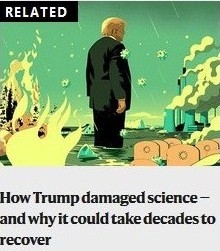 cience is the practice of studying nature and reporting honestly what it
finds. Its authority lies in the integrity of this connection and in its
dispassionate point of view. That connection is severed when scientific
journals use their influence to tell us what to believe. That's why today's
editorial at Nature.com
is so disturbing.
cience is the practice of studying nature and reporting honestly what it
finds. Its authority lies in the integrity of this connection and in its
dispassionate point of view. That connection is severed when scientific
journals use their influence to tell us what to believe. That's why today's
editorial at Nature.com
is so disturbing.
The French philosopher Bruno Latour, in his book Pandora's Hope: Essays on the Reality of Science Studies, described science this way: “The goal of science is to create a stable flow of reference between the world and its representation, which we call knowledge.”
Politics is the exact opposite. Politics is the art of coercing people into telling you what you wish to be true. It enforces a particularized view of the world in which truth is defined not by reference to a stable external reality but by its ever-changing consequentialist and utilitarian benefits. Such benefits can only be defined in terms of a goal, and the goal of politics is to obtain power.

A copy of Nature magazine that accidentally fell off my desk
History shows unequivocally whenever science and politics mix, science loses: instead of empirical facts, politicized science gives us lies, exaggerations, censorship, and intimidation. The climate debate, for example, would have been over decades ago if not for politicization. That politicization was helped by magazines like Nature, which published articles like this one (paywalled but discussed here) in which politicized scientists claimed to be able to predict, Cassandra-like, 467 phenomena guaranteed to occur—predictions which reasonable skeptics concluded were utterly without any scientific basis.
The Soviet Union showed us the end-result of politicization of science, giving us the word Lysenkoism, along with many other great words like gulag, zek, and Chernobyl. The credibility of biology research in Russia has never recovered.
When our objectivity is lost, we get political activists on all sides challenging our results, and rightfully so: in politics every assertion and every claim is made in support of some agenda, and lying and coercion are considered perfectly acceptable and even necessary as a means of obtaining power.
Is this really what we want for science? Power is seductive, and no doubt the editors of Nature are right about Joe Biden. (For those reading this in 2025, Biden is believed to have been a US presidential candidate during the infamous election fiasco in the before-time, around 2020, though records from that era are sketchy.) Biden would, as the Nature editors put it, “commit institutions to work harder to protect equality, diversity and inclusion, and to give more space to voices from previously marginalized communities.”

Advertisement for Anti-Trump article at nature.com
The way to know whether something is a political issue is to ask what happens if you question it. Go ahead, question “equality, diversity, and inclusion” at a university and see what happens to you. I'll wait.
Back already? Now that you're unemployed and blacklisted, the dean has revoked your tenure and published a statement denouncing you, and there's an angry mob outside your door chanting slogans, explain to me again how an alliance with politics would benefit science. Nature itself showed us where this leads a few weeks ago with this UK-based magazine took it upon themselves to tell American citizens whom we should vote for. This week they added an article titled “How Trump damaged science and why it could take decades to recover.”
In their editorial they write:
The principle that the state will respect scholarly independence is one of the foundations underpinning modern research, and its erosion carries grave risks for standards of quality and integrity in research and policymaking. When politicians break that covenant, they endanger the health of people, the environment and societies. . . .
The conventions that have guided the relationship between science and politics are under threat, and Nature cannot stand by in silence.
As examples, they give mostly vague assertions, and some dubious specifics:
Last year, Brazil's President Jair Bolsonaro sacked the head of the country's National Institute for Space Research because the president refused to accept the agency's reports that deforestation in the Amazon has accelerated during his tenure.
Yeah baby, that's what happens when science gets politicized: your friends get sacked and you get outraged that something you think is true is rejected by your enemies. Politics is hate. Even PNAS is starting to dabble in politics. Nature's American counterpart Science deserves praise for resisting it (though with limited success). Scientific journals must set an example by rejecting politics. The credibility of science depends on it.
oct 08 2020, 5:21 am
